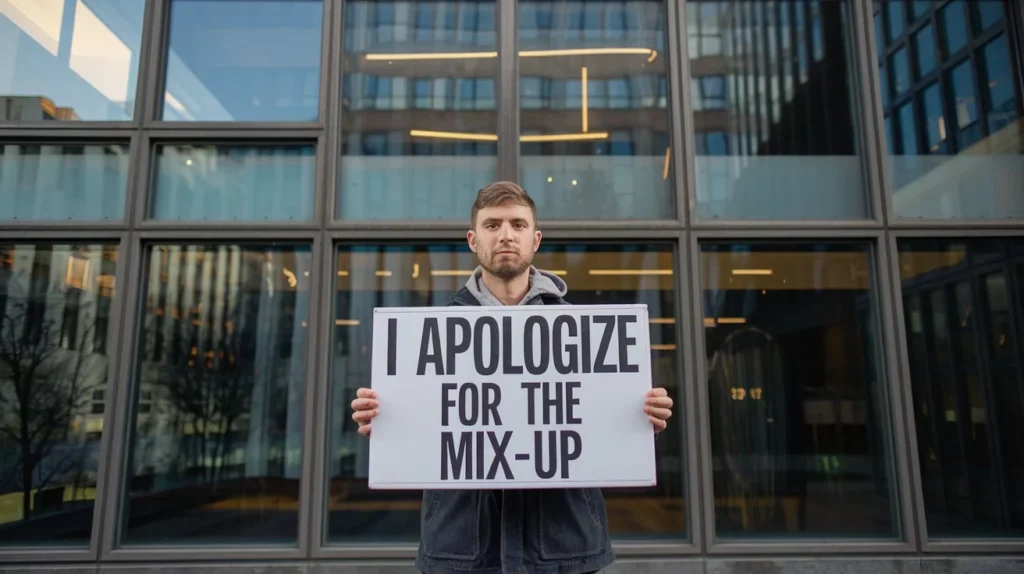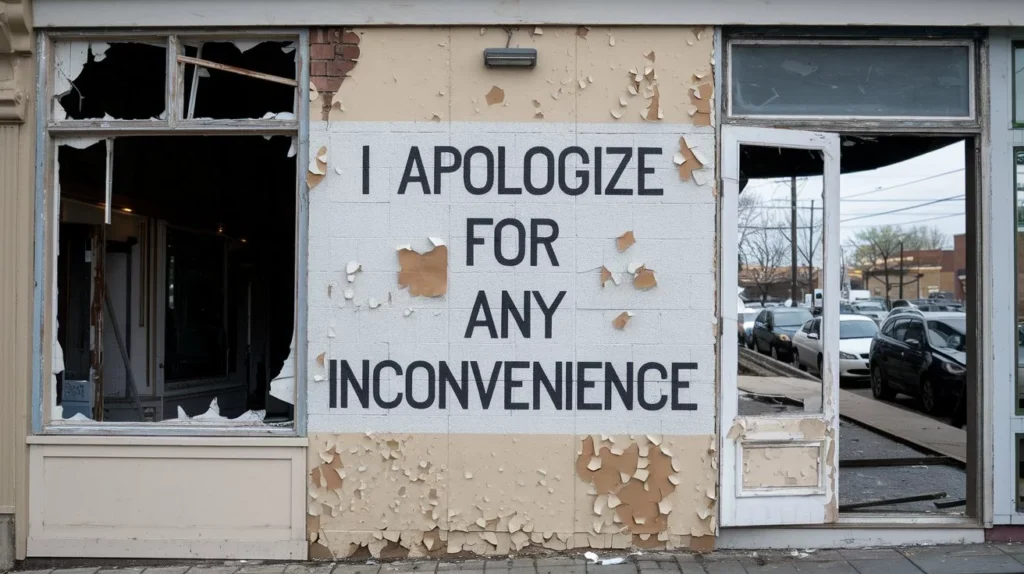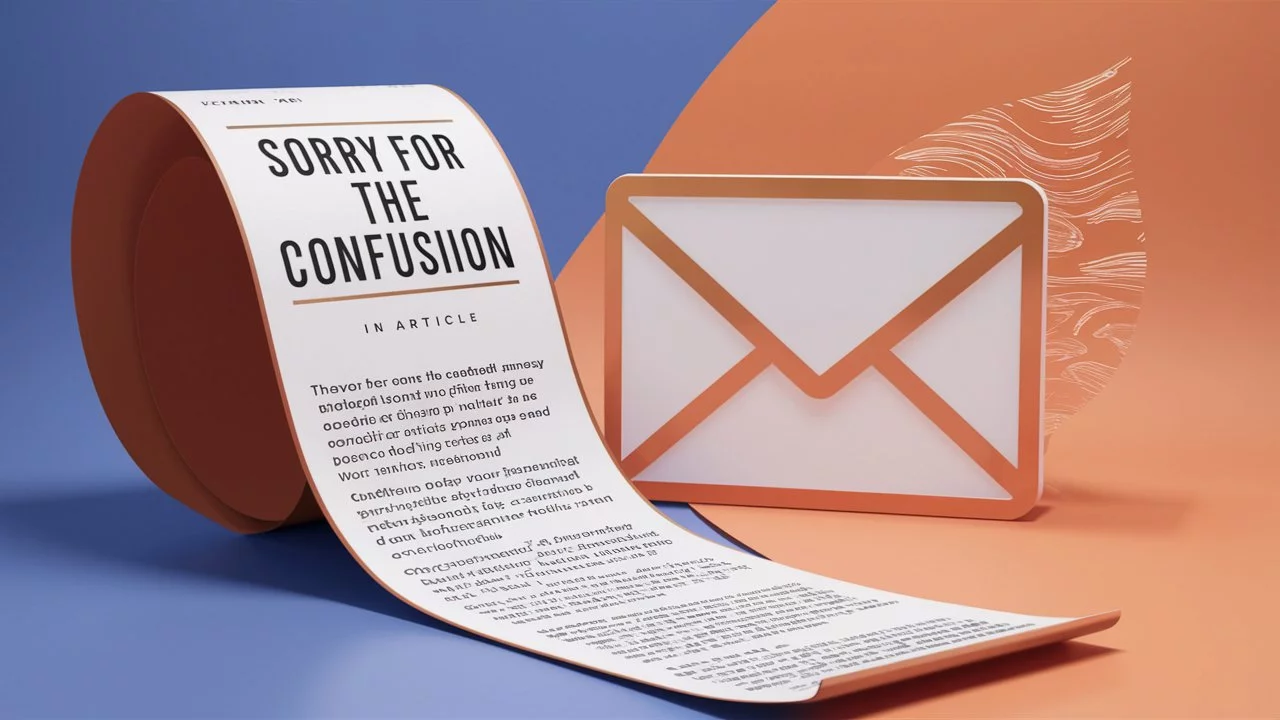Miscommunications and misunderstandings are inevitable in any professional setting. How you address these situations can significantly impact your professional relationships and the overall effectiveness of your communication. Using professional synonyms for “Sorry for the confusion” can help convey your apology more effectively, maintaining respect and clarity. In this article, we will explore 25 professional alternatives, each accompanied by a practical email example to help you navigate these situations with confidence and poise.
List of Professional Synonyms for “Sorry for the Confusion” in an Email
- Apologies for Any Misunderstanding
- I Regret Any Confusion Caused
- Sorry for Any Ambiguity
- Apologies for the Miscommunication
- I Regret Any Miscommunication
- Sorry for the Mix-Up
- Apologies for any Miscommunication
- I Regret the Confusion
- Sorry for the Misunderstanding
- Apologies for the Confusion
- Sorry for Any Confusion
- I Apologize for the Misunderstanding
- Sorry for the Miscommunication
- Apologies for the Confusion Earlier
- Sorry for the Lack of Clarity
- I Apologize for the Mix-Up
- Sorry for any Misinterpretation
- Apologies for the Misunderstanding Earlier
- Sorry for the Confusion Caused
- I Apologize for Any Inconvenience
- Sorry for the Misinterpretation
- Apologies for any Miscommunication Earlier
- Sorry for the Lack of Information
- I Apologize for Any Misunderstanding
- Sorry for any Misinterpretation Earlier
1. Apologies for Any Misunderstanding
Usage: This phrase acknowledges that a misunderstanding occurred without placing blame on either party.
Scenario Example:
Subject: Clarification on Yesterday’s Meeting
Hi Leo,
I hope this email finds you well.
Apologies for any misunderstanding that may have arisen from our discussion yesterday regarding the project timeline. To ensure we’re on the same page, I’d like to clarify that the next milestone is due on August 15th, not August 5th.
Please let me know if you have any questions or need further clarification.
Best regards, Henry
Adding a specific reference to what caused the misunderstanding helps clear up any confusion.
2. I Regret Any Confusion Caused
Usage: This phrase shows empathy and regret for the confusion.
Scenario Example:
Subject: Update on Project Deadlines
Dear Leo,
I hope you’re doing well.
I regret any confusion caused by my previous email regarding the project deadlines. The final report is due by the end of this month, not the end of next week as initially mentioned.
Thank you for your understanding, and feel free to reach out if you need any more details.
Best, Henry
Expressing regret helps maintain a positive relationship despite the error.
3. Sorry for Any Ambiguity

Usage: This phrase works well when the initial communication is not clear.
Scenario Example:
Subject: Details on the Upcoming Presentation
Hi Leo,
I hope your day is going well.
Sorry for any ambiguity in my last message about the presentation schedule. To clarify, the presentation will start at 10 AM, not 9 AM, on Tuesday.
Please let me know if you need any further information.
Kind regards, Henry
Clarity is crucial; correcting ambiguity ensures everyone is well-informed.
4. Apologies for the Miscommunication
Usage: This is a straightforward way to acknowledge that the communication was not clear.
Scenario Example:
Subject: Project Budget Clarification
Dear Leo,
I trust you are well.
Apologies for the miscommunication in my last email regarding the project budget. The allocated amount for the new software is $5,000, not $500.
Please let me know if you need more details.
Best regards, Henry
Being straightforward about the miscommunication helps resolve issues quickly.
5. I Regret Any Miscommunication
Usage: This phrase is similar to the previous one but adds a touch of formality.
Scenario Example:
Subject: Clarification on Task Assignments
Hi Leo,
I hope this message finds you well.
I regret any miscommunication regarding the task assignments for this week. You are assigned to the client presentation on Wednesday, not the internal meeting on Tuesday.
If there are any questions or further clarifications needed, please do not hesitate to ask.
Best, Henry
Adding regret to the miscommunication shows a higher level of empathy.
6. Sorry for the Mix-Up
Usage: This informal phrase is suitable for less formal environments.
Scenario Example:
Subject: Team Meeting Time
Hey Leo,
I hope you’re doing great.
Sorry for the mix-up about the team meeting time. It will be at 3 PM, not 2 PM, on Friday.
Thanks for understanding!
Cheers, Henry
Keeping it casual helps in informal settings while still addressing the issue.
7. Apologies for Any Miscommunication
Usage: This phrase is versatile and suitable for most professional environments.
Scenario Example:
Subject: Revision of the Project Plan
Dear Leo,
I hope this email finds you in good spirits.
Apologies for any miscommunication regarding the revision of the project plan. The latest version is attached to this email, reflecting the changes discussed in our last meeting.
Please review it at your earliest convenience and let me know if you have any questions.
Best regards, Henry
This phrase covers most bases and maintains professionalism.
8. I Regret the Confusion
Usage: This phrase adds a formal tone to the apology.
Scenario Example:
Subject: Clarification of Meeting Agenda
Hi Leo,
I hope you are well.
I regret the confusion caused by the earlier email about the meeting agenda. The correct agenda is attached, with the main focus being on the budget review, not the marketing strategy.
Thank you for your patience and understanding.
Best, Henry
A formal tone helps in maintaining respect and professionalism.
9. Sorry for the Misunderstanding
Usage: This phrase directly addresses the misunderstanding.
Scenario Example:
Subject: Update on Project Deliverables
Hi Leo,
I trust you are well.
Sorry for the misunderstanding regarding the project deliverables. The final deliverable includes both the report and the presentation slides, not just the report.
Please let me know if there’s anything else you need.
Best, Henry
Directly addressing the misunderstanding helps in clarifying any confusion.
10. Apologies for the Confusion
Usage: This phrase is simple and effective.
Scenario Example:
Subject: Invoice Payment Details
Dear Leo,
I hope this message finds you well.
Apologies for the confusion about the invoice payment details. The correct amount due is $1,200, not $1,500.
Thank you for your understanding, and please let me know if there are any other questions.
Best regards, Henry
Simplicity often works best in professional communication.
11. Sorry for Any Confusion
Usage: This informal phrase can be used in less formal emails.
Scenario Example:
Subject: Scheduling Conflict
Hey Leo,
I hope you’re doing well.
Sorry for any confusion about the meeting schedule. The correct date for our next meeting is Thursday at 2 PM, not Wednesday.
Thanks for understanding!
Best, Henry
Informal phrasing suits more relaxed professional environments.
12. I Apologize for the Misunderstanding
Usage: This phrase is formal and respectful.
Scenario Example:
Subject: Clarification on Product Specifications
Hi Leo,
I hope you are doing well.
I apologize for the misunderstanding regarding the product specifications. The correct dimensions are 10×5 inches, not 8×4 inches.
Please let me know if you need further information.
Best regards, Henry
Formality and respect go a long way in maintaining professional relationships.
13. Sorry for the Miscommunication
Usage: This phrase is casual yet professional.
Scenario Example:
Subject: Correction on Event Details
Hey Leo,
I hope all is well.
Sorry for the miscommunication about the event details. The venue has been changed to the Grand Hall, not the Conference Room.
Thanks for your understanding.
Best, Henry
Balancing casualness and professionalism can be effective in many settings.
14. Apologies for the Confusion Earlier
Usage: This phrase acknowledges the timing of the confusion.
Scenario Example:
Subject: Update on Training Session
Hi Leo,
I hope you’re having a good day.
Apologies for the confusion earlier regarding the training session schedule. The session will begin at 9 AM sharp, not 10 AM.
Thank you for your patience.
Best, Henry
Acknowledging the timing helps address past confusion specifically.
15. Sorry for the Lack of Clarity
Usage: This phrase directly addresses the issue of clarity.
Scenario Example:
Subject: Clarification on Budget Allocation
Dear Leo,
I hope this email finds you well.
Sorry for the lack of clarity in my previous email about the budget allocation. The marketing budget is $20,000, not $15,000.
Please let me know if you have any questions.
Best regards, Henry
Addressing clarity issues helps prevent future misunderstandings.
16. I Apologize for the Mix-Up

Usage: This phrase is formal and suitable for addressing errors.
Scenario Example:
Subject: Update on Shipping Details
Hi Leo,
I hope you’re doing well.
I apologize for the mix-up regarding the shipping details. The correct tracking number is 123456789, not 987654321.
Thank you for your understanding.
Best, Henry
Formality and specificity help resolve issues efficiently.
17. Sorry for Any Misinterpretation
Usage: This phrase addresses potential misinterpretations.
Scenario Example:
Subject: Clarification on Contract Terms
Dear Leo,
I hope this message finds you well.
Sorry for any misinterpretation of the contract terms in my previous email. The service agreement includes quarterly reviews, not monthly reviews.
Please feel free to reach out if you need further clarification.
Best regards, Henry
Addressing misinterpretations directly helps in clearing up any misunderstandings.
18. Apologies for the Misunderstanding Earlier
Usage: This phrase acknowledges the past misunderstanding.
Scenario Example:
Subject: Correction on Meeting Location
Hi Leo,
I hope you’re having a good day.
Apologies for the misunderstanding earlier regarding the meeting location. The meeting will be held in Room 101, not Room 201.
Thank you for your understanding.
Best, Henry
Addressing past misunderstandings helps in preventing future ones.
19. Sorry for the Confusion Caused
Usage: This phrase is direct and acknowledges the effect of the confusion.
Scenario Example:
Subject: Update on Project Timeline
Dear Leo,
I trust you are well.
Sorry for the confusion caused by my previous email regarding the project timeline. The project completion date is set for September 30th, not September 15th.
Please let me know if there are any other questions.
Best regards, Henry
Direct acknowledgment helps in resolving issues promptly.
20. I Apologize for Any Inconvenience

Usage: This phrase addresses the inconvenience caused by the confusion.
Scenario Example:
Subject: Clarification on Delivery Schedule
Hi Leo,
I hope you are well.
I apologize for any inconvenience caused by my previous message regarding the delivery schedule. The delivery is expected by Friday, not Thursday.
Thank you for your patience and understanding.
Best regards, Henry
Acknowledging inconvenience shows empathy and consideration.
21. Sorry for the Misinterpretation
Usage: This phrase is suitable when there has been a misinterpretation.
Scenario Example:
Subject: Details on Product Launch
Dear Leo,
I hope this email finds you well.
Sorry for the misinterpretation regarding the product launch date. The launch is scheduled for October 10th, not October 1st.
Please let me know if you need any further details.
Best regards, Henry
Directly addressing the misinterpretation helps clear up confusion.
22. Apologies for Any Miscommunication Earlier
Usage: This phrase acknowledges the timing of the miscommunication.
Scenario Example:
Subject: Update on Conference Call Schedule
Hi Leo,
I hope you’re doing well.
Apologies for any miscommunication earlier regarding the conference call schedule. The call is set for 2 PM EST, not 2 PM PST.
Thank you for your understanding.
Best, Henry
Acknowledging the timing of the miscommunication helps resolve issues.
23. Sorry for the Lack of Information
Usage: This phrase addresses the issue of missing information.
Scenario Example:
Subject: Follow-Up on Meeting Notes
Dear Leo,
I hope this message finds you well.
Sorry for the lack of information in my previous email regarding the meeting notes. The detailed notes are attached to this email for your reference.
Please let me know if you have any questions.
Best regards, Henry
Providing the missing information helps in resolving confusion effectively.
24. I Apologize for Any Misunderstanding

Usage: This phrase is formal and respectful.
Scenario Example:
Subject: Clarification on Project Roles
Hi Leo,
I hope you are doing well.
I apologize for any misunderstanding regarding the project roles. You are assigned as the lead developer, not the assistant developer.
Please let me know if there are any questions or if further clarifications are needed.
Best regards, Henry
Formality and respect help in maintaining professional relationships.
25. Sorry for Any Misinterpretation Earlier
Usage: This phrase acknowledges past misinterpretations.
Scenario Example:
Subject: Update on Marketing Strategy
Dear Leo,
I hope this email finds you well.
Sorry for any misinterpretation earlier regarding the marketing strategy. The focus is on digital marketing, not traditional marketing.
Please let me know if you need any further details or clarifications.
Best regards, Henry
Addressing past misinterpretations helps prevent future misunderstandings.










